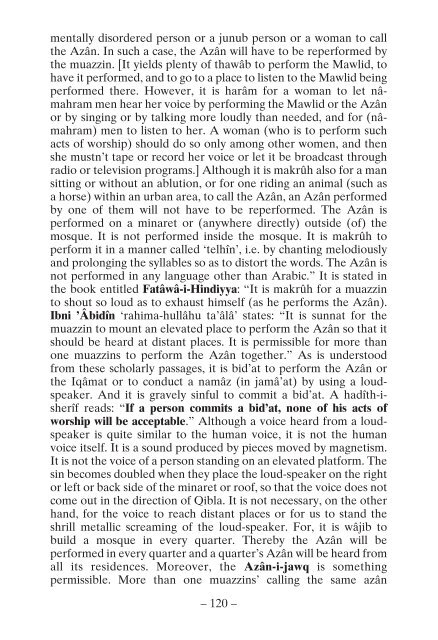Miftah-ul-Janna (Booklet for way to Paradise)
You also want an ePaper? Increase the reach of your titles
YUMPU automatically turns print PDFs into web optimized ePapers that Google loves.
mentally disordered person or a junub person or a woman <strong>to</strong> call<br />
the Azân. In such a case, the Azân will have <strong>to</strong> be reper<strong>for</strong>med by<br />
the muazzin. [It yields plenty of thawâb <strong>to</strong> per<strong>for</strong>m the Mawlid, <strong>to</strong><br />
have it per<strong>for</strong>med, and <strong>to</strong> go <strong>to</strong> a place <strong>to</strong> listen <strong>to</strong> the Mawlid being<br />
per<strong>for</strong>med there. However, it is harâm <strong>for</strong> a woman <strong>to</strong> let nâmahram<br />
men hear her voice by per<strong>for</strong>ming the Mawlid or the Azân<br />
or by singing or by talking more loudly than needed, and <strong>for</strong> (nâmahram)<br />
men <strong>to</strong> listen <strong>to</strong> her. A woman (who is <strong>to</strong> per<strong>for</strong>m such<br />
acts of worship) sho<strong>ul</strong>d do so only among other women, and then<br />
she mustn’t tape or record her voice or let it be broadcast through<br />
radio or television programs.] Although it is makrûh also <strong>for</strong> a man<br />
sitting or without an ablution, or <strong>for</strong> one riding an animal (such as<br />
a horse) within an urban area, <strong>to</strong> call the Azân, an Azân per<strong>for</strong>med<br />
by one of them will not have <strong>to</strong> be reper<strong>for</strong>med. The Azân is<br />
per<strong>for</strong>med on a minaret or (anywhere directly) outside (of) the<br />
mosque. It is not per<strong>for</strong>med inside the mosque. It is makrûh <strong>to</strong><br />
per<strong>for</strong>m it in a manner called ‘telhîn’, i.e. by chanting melodiously<br />
and prolonging the syllables so as <strong>to</strong> dis<strong>to</strong>rt the words. The Azân is<br />
not per<strong>for</strong>med in any language other than Arabic.” It is stated in<br />
the book entitled Fatâwâ-i-Hindiyya: “It is makrûh <strong>for</strong> a muazzin<br />
<strong>to</strong> shout so loud as <strong>to</strong> exhaust himself (as he per<strong>for</strong>ms the Azân).<br />
Ibni ’Âbidîn ‘rahima-h<strong>ul</strong>lâhu ta’âlâ’ states: “It is sunnat <strong>for</strong> the<br />
muazzin <strong>to</strong> mount an elevated place <strong>to</strong> per<strong>for</strong>m the Azân so that it<br />
sho<strong>ul</strong>d be heard at distant places. It is permissible <strong>for</strong> more than<br />
one muazzins <strong>to</strong> per<strong>for</strong>m the Azân <strong>to</strong>gether.” As is unders<strong>to</strong>od<br />
from these scholarly passages, it is bid’at <strong>to</strong> per<strong>for</strong>m the Azân or<br />
the Iqâmat or <strong>to</strong> conduct a namâz (in jamâ’at) by using a loudspeaker.<br />
And it is gravely sinf<strong>ul</strong> <strong>to</strong> commit a bid’at. A hadîth-isherîf<br />
reads: “If a person commits a bid’at, none of his acts of<br />
worship will be acceptable.” Although a voice heard from a loudspeaker<br />
is quite similar <strong>to</strong> the human voice, it is not the human<br />
voice itself. It is a sound produced by pieces moved by magnetism.<br />
It is not the voice of a person standing on an elevated plat<strong>for</strong>m. The<br />
sin becomes doubled when they place the loud-speaker on the right<br />
or left or back side of the minaret or roof, so that the voice does not<br />
come out in the direction of Qibla. It is not necessary, on the other<br />
hand, <strong>for</strong> the voice <strong>to</strong> reach distant places or <strong>for</strong> us <strong>to</strong> stand the<br />
shrill metallic screaming of the loud-speaker. For, it is wâjib <strong>to</strong><br />
build a mosque in every quarter. Thereby the Azân will be<br />
per<strong>for</strong>med in every quarter and a quarter’s Azân will be heard from<br />
all its residences. Moreover, the Azân-i-jawq is something<br />
permissible. More than one muazzins’ calling the same azân<br />
– 120 –

















